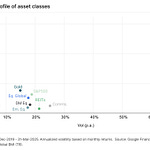Below is a guest post from Amy Davine Kim, Chief Policy Officer of the Chamber of Digital Commerce. I will be attending their blockchain summit on March 11th and wanted the organization to give a preview of the types of conversations that will happen at the event. Enjoy this guest post and hope each of you has a great weekend!
One of the most difficult questions plaguing the digital asset industry is that of when is a digital asset a security, and when is it not? What are the rules? In some cases, this is obvious – for example, a digital representation of a physical equity or debt is itself a security. But in others, more consideration is needed. For example, when an investment contract is formed between a digital asset (token) provider and a buyer, and the buyer then receives the token, has been the subject of much discussion. In fact, the question is so thorny that the SEC has issued at least 17 pieces of guidance, and taken 48 enforcement actions, of which 26 have gone to court.
The questions surrounding this space are creating a chill in the United States for blockchain development projects. Having the perspective of our more than 220 members and almost six years of experience representing our industry, we can see a clear shift toward projects overseas. Anywhere overseas. And businesses are not just looking for friendlier regulatory regimes. They are looking for clear rules of the road, with goal posts and yard lines well-marked, points delineated for certain accomplishments, penalties spelled out for clearly defined violations. Imagine if you were a football player, and the referees may or may not acknowledge your touchdown or call a penalty. Would you reconsider your playbook? Would you play the game at all?
The Chamber has long taken the position that violations of law must incur penalties. Orderly application of laws creates a fair marketplace. It seems, however, that we have fully embraced this role, without the corresponding consideration of how to support innovative technologies to create new and better networks.
That’s why Commissioner Peirce’s safe harbor proposal is important. In it we see the Commissioner attempt to create a period of time in which developing companies can grow a network that is never intended to be a security or operate as one. Certain consumer protection principles must be met to comply with the requirements, and the platform must meet “Network Maturity” within three years to receive the full benefit of the safe harbor and, presumably, not be considered a security at the other end.
Notably, Network Maturity is reached when a platform is decentralized or functional. This is important because it demonstrates an evolution from Director Hinman’s speech, Digital Asset Transactions: When Howey Met Gary (Plastic) in June 2018, in which he determined that certain tokens, such as bitcoin and ether, have become so decentralized that they are no longer considered securities (if they ever were). Decentralization, if we are able to define it sufficiently, would eliminate the presence of one factor in the Howey test, reliance on the efforts of others. However, the safe harbor also allows for another option, functionality. These do not need to be achieved together, but are alternatives, either of which defeats the Howey analysis because, at functionality, the item has become a consumable good.
The achievement is also notable because it no longer forces companies into one business model – that of decentralization. While decentralization is one of the true transformations that Bitcoin and other protocols offer (allowing those who do not know or necessarily trust each other to interact), requiring this element as the only way to avoid the application of the securities laws forces businesses into one type of business model. Why should founders be forced to create something that must be released to a broad community and step back from the project, relying on smart contracts and a network of validators to continue to function? While Bitcoin and others like it are extraordinary, we have seen some projects that would greatly benefit from the founders’ continued involvement to enhance or evolve the protocol’s functionality. Businesses are not static; they adapt to changing environments, competition, customer needs, and demand. We should allow for the possibility of this dynamic environment for blockchain platforms as well.
Commissioner Peirce joined the Chamber for a private meeting last week to detail her views on this proposal and take questions from our members directly. While many of our members are supportive, some asked questions probing certain points. In my view, receiving critical views can sometimes be even more productive – causing creators to think carefully about proposals and enhance them to address all angles. While we have recommendations to help enhance Commissioner Peirce’s proposal, I appreciate her effort to develop such an innovative idea and create clear rules for players to follow.
One of my favorite quotes is by Sam Rayburn (for whom the Rayburn Building in the U.S. Capitol is named): “Any jackass can kick down a barn, but it takes a carpenter to build one.” Commissioner Peirce has not only proven herself an independent voice in the community, but also shown she is a budding carpenter and, as comments come in, a busy referee.
Want to hear directly from Commissioner Peirce? Join Pomp and CryptoMom on March 11-12 at the DC Blockchain Summit at Georgetown University. Use the code – POMP – to save 15% off. Register today at www.dcblockchainsummit.com.
THE RUNDOWN:
US House Committee to Hold Hearing on Blockchain Benefits for Small Businesses: The U.S. House of Representatives Committee on Small Business is set to discuss the benefits blockchain technology can bring to entrepreneurs. Slated for March 4 at 16:30 UTC, the "Building Blocks of Change: The Benefits of Blockchain Technology for Small Businesses" hearing will explore the ways in which some startups are utilizing blockchain technology to boost productivity and increase security. Read more.
Coinbase Is Testing Clearview’s Controversial Facial Recognition Technology: Coinbase is among more than 2,000 entities from around the world working with Clearview, a controversial facial recognition technology provider. Internal documents obtained by BuzzFeed revealed New York-based Clearview AI – a startup facing legal threats from Apple and Google as well as calls for greater scrutiny into its practices – had already shared or sold its technology to roughly 2,200 companies and authorities based all around the world. Read more.
ICE’s New Intel Program Used in Every Homeland Security Crypto Investigation: Immigration and Customs Enforcement’s recently disclosed “Cryptocurrency Intelligence Program” is deployed in every crypto-facing Homeland Security Investigations case, says the agent whose unit built the tool. In an email statement, Al Giangregorio – unit chief at the HSI's National Bulk Cash Smuggling Center – shed a little light on the mysterious intel program first mentioned in ICE’s recent FY 2021 budget proposal. Without explaining exactly what CIP is or how it works, he broadly said it helps HSI agents whenever cryptocurrency is involved. Read more.
Coronavirus Hits US Stocks, Bitcoin Climbs, Haven Status Unclear: The spreading coronavirus sowed a new bout of fear among investors, triggering a stock market sell-off and flight to safe-haven assets like gold and U.S. Treasury bonds, with 47 countries now reporting infections amid widespread reports of travel cancellations, shipment delays and business interruptions. U.S. stocks fell for the sixth straight day, Treasury yields slid to a record low and gold prices were little changed close to a seven-year high. Bitcoin’s price climbed 1.4 percent to $8,902, rising along with popular cryptocurrencies including ether. Read more.
Startup Tokenizes $2.2B in Commercial Real Estate Through Polymath: Commercial real estate marketplace Red Swan has tokenized $2.2 billion in real estate through security token platform Polymath. According to Red Swan CEO Ed Nwokedi, $780 million of that is available to investors in pre-sale, while the company has another $4 billion in real estate in its tokenization pipeline. The $2.2 billion represents 16 different Class A commercial properties based in Austin and Houston, Texas, Brooklyn, N.Y., Oakland, Calif., and Ontario, Canada. Read more.

LISTEN TO THIS EPISODE OF THE OFF THE CHAIN PODCAST HERE
Austin Rief is the Co-Founder of Morning Brew, a new media company bringing you informative and digestible business news. He and his team have built a business with ~ 2 million subscribers, $13+ million in revenue, and 35+ employees in less than 4 years. They are consistently on top of every media or millennial business trend, while having thought a lot about various aspects of the industry. I also try to convince Austin of Bitcoin’s future in the world which was fun. Hope you enjoy this one!
In this conversation, Austin and I discuss:
The founding story of Morning Brew
What media companies he is obsessed with
How his team grew their email list so quickly in college
Why Morning Brew is expanding into other verticals and media formats
I really enjoyed this conversation with Austin. Hopefully you enjoy it too.
LISTEN TO THIS EPISODE OF THE OFF THE CHAIN PODCAST HERE
Podcast Sponsors
These companies make the podcast possible, so go check them out and thank them for their support!
TaxBit automates your cryptocurrency taxes, enabling you to effortlessly track, calculate, and report your transactions. Get 10% off your tax plan today with a free trial by going to www.taxbit.com/invite/Pomp
Unstoppable Domains is working to make the internet operate how it was originally intended, which means anyone can publish anything from anywhere. You can go to unstoppabledomains.com and claim your censorship resistant domain today.
BlockFi allows you to keep your crypto, put it up as collateral, and receive a USD loan funded directly to your bank account. They do loans ranging from $2,000 to $10,000,000, and they're perfect for helping you reach your financial goals of all sizes. Visit BlockFi.com/Pomp to learn more about putting your crypto to work without having to sell it by getting a loan or earning interest in their interest bearing accounts.
Crypto.com allows you to buy, sell, store, earn, loan, and invest various cryptocurrencies in an user friendly mobile app. Join over one million users today. You can download and earn $50 USD with my code “pomp2020” when you sign up for one of their metal cards today.
Travala.com is the world’s leading blockchain-based travel booking platform trusted by thousands of customers worldwide as their preferred online travel agency. The Travala.com platform currently offers 2,000,000+ properties in 230 countries with prices up to 40% cheaper than mainstream travel booking platforms.
If you enjoy reading “Off The Chain,” click here to tweet to tell others about it.
Nothing in this email is intended to serve as financial advice. Do your own research.













Share this post